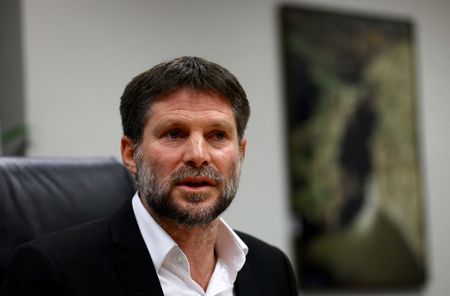 1
1 1
1
JERUSALEM (Reuters) – A top Israeli minister defied U.S. concern over settlement building in the occupied West Bank on Monday, saying the government would continue building and would not accept “preaching” from other countries.
“This is our country, all of it,” said Finance Minister Bezalel Smotrich, who also holds some West Bank powers, during his party faction meeting. “Does anyone think that Israel will be managed like another U.S. state? I will not accept moral preaching from anybody,” Kan broadcaster reported him saying.
Most countries deem Jewish settlements built on land Israel occupied in a 1967 Middle East war as illegal, and their expansion has for decades been among the most contentious issues between Israel, the Palestinians and the international community.
Palestinian leaders have sought to establish an independent state in the West Bank and Gaza with East Jerusalem as its capital, and say settlements undermine hopes of a viable state.
On Sunday, Prime Minister Benjamin Netanyahu’s religious-nationalist government said it planned to approve 4,560 new housing units in various areas of the West Bank. The U.S. State Department said it was “deeply troubled” by the decision.
“As has been longstanding policy, the United States opposes such unilateral actions that make a two-state solution more difficult to achieve and are an obstacle to peace,” the statement said.
Senior Palestinian official Hussein Al-Sheikh said the Palestinian Authority, which exercises limited self-rule in the West Bank, boycotted an economic meeting with Israel scheduled for Monday in protest of settlement growth.
Another Palestinian official, Wasel Abu Youssef, called on the international community to move from statements of condemnation “to imposing a boycott on the government of the Israeli occupation” and urged Arab countries to suspend normalisation agreements with Israel.
Since taking office in January, Netanyahu’s coalition has approved the promotion of more than 7,000 new housing units, most deep in the West Bank. It also amended a law to clear the way for settlers to return to four settlements that had previously been evacuated.
According to the United Nations, some 700,000 settlers live in 279 settlements across the West Bank and East Jerusalem, up from 520,000 in 2012.
Israel cites biblical, historical and political ties to the area and in a recent interview with Sky News, Netanyahu said Israeli settlements were not an obstacle to peace with the Palestinians.
(Reporting by Henriette Chacar; Additional reporting by Ali Sawafta and Nidal al-Mughrabi; Editing by Chizu Nomiyama)